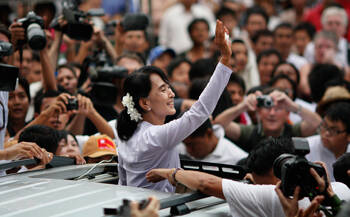Nonviolent Revolution?
Genuine democracy is still a long way off, but Myanmar (Burma) has made progress. Daw Aung San Suu Kyi (and her National League for Democracy Party), denied power by a military junta and kept under house arrest after she won the presidential election 22 years ago, is back in parliament—not as president but as an elected representative of the people. President U Thein Sein, a former general and member of the ruling junta-backed party who became president a year ago, has been surprisingly reform-minded. He has released hundreds of political prisoners, broadened eligibility for political candidates and reformed banking and currency exchange. But the motivation of Myanmar’s powerful military is unclear. Is democracy the goal, or is the intention to garner economic assistance while nipping the buds of any Asian Spring?
Secretary of State Hillary Clinton has lauded the April election. She announced that the United States would restore diplomatic relations, easing the way for international foreign aid. Thomas Carothers, vice president for studies at the Carnegie Endowment for International Peace, has called the parliamentary election “a doorway to a possible democratic transition.”
Given 50 years of military rule and a constitution still under discussion, full democracy in Myanmar seems years away. But reform is possible. Ms. Aung San Suu Kyi’s patient witness to nonviolent revolution, which earned her a Nobel Prize and focused global attention on Myanmar, could be just what the country and its new president need to bring democratic reform.
Despair and Defiance
Few acts of individual sacrifice and protest are as dramatic and horrifying as self-immolation. Though suicide is never morally justifiable, self-immolation has at times effectively drawn attention to injustice. In the early 1960s, the self-immolation of monks drew worldwide attention to the mistreatment of Vietnamese Buddhists. The Arab Spring movement began in Tunisia after a street vendor engaged in this striking act of despair and defiance.
But more than 30 self-immolations in India and China recently have not succeeded in capturing global attention. The deaths are a grim testament to the rising desperation of Tibetans as thousands of Han Chinese “immigrants” threaten to overwhelm Tibet’s unique culture, language and religious tradition. Chinese officials have gone to great lengths to limit media coverage.
“There is no such thing as a Tibet problem,” a Chinese spokesperson glibly declared in October after the first wave of self-immolations, an official position confirmed by the practical silence of world powers. Though pro-forma statements of regret have been issued periodically as the body count grows higher, the world has come to accept with diminishing complaint China’s cultural and political annexation of Tibet. Tibet’s government-in-exile is promoting a “third way,” calling for political and cultural autonomy but not outright independence for Tibet. It is a reasonable path forward that may offer a face-saving way out for a newly emerging generation of Chinese leaders, who may be seeking a conciliatory resolution to decades of confrontation over Tibet. If these deaths draw attention to this alternative and inspire U.S. support, they will not, as now appears to be the case, have been for nothing.
A Tale of Two Parks
Two new ballparks opened at the start of the 2012 baseball season. On April 4, ESPN televised the national debut of Marlins Park in Miami, Fla. The 37,000-seat stadium is home to the newly branded Miami Marlins, a team that boasts a new coach and several high-profile free agents. The stadium seeks to emulate the glamour of Miami’s famed South Beach. A swimming pool sits beyond the left field fence. Below the seats behind home plate there are aquariums with nearly 100 swimming fish.
In the Bronx, N.Y., Cardinal Hayes High School opened the season on its home field for the first time in years. The team traditionally played home games in a public park adjoining Yankee Stadium. When the Yankees built a new stadium in 2008, the Cardinal Hayes squad was displaced. After years of wrangling between city and team officials, Heritage Field opened earlier this month on the site of the former Yankee Stadium. While not as costly as Marlins Park, which cost over $600 million of taxpayer money, the public park includes some expensive details, including a professional-grade grass outfield.
Jeffrey Loria, owner of the Marlins, claims his team’s new field will be a boon to the city of Miami. Perhaps. Yet only a few players will have a chance to play there; on most nights the stadium will be baseball free. But dozens of teams have expressed interest in competing at Heritage Field, which is open to the general public. Located in a densely populated urban neighborhood, the park is likely to be busy into the twilight hours. One can easily imagine generations of young athletes playing on these fields. Will the same be true of Mr. Loria’s baseball palace? Or will it be torn down in a generation, like many professional stadiums, in favor of something new and even more extravagant?








